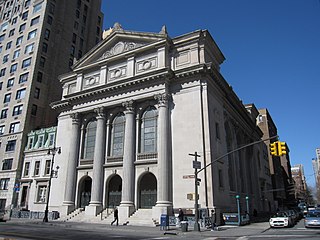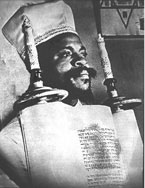Related Research Articles
Levites or Levi are Jewish males who claim patrilineal descent from the Tribe of Levi. The Tribe of Levi descended from Levi, the third son of Jacob and Leah. The surname Halevi, which consists of the Hebrew definite article "ה" Ha- ('the') plus Levi ('Levite'), is not conclusive regarding being a Levite; a titular use of HaLevi indicates being a Levite. The daughter of a Levite is a Bat Levi.

The United Synagogue of Conservative Judaism (USCJ) is the major congregational organization of Conservative Judaism in North America, and the largest Conservative Jewish communal body in the world. USCJ closely works with the Rabbinical Assembly, the international body of Conservative rabbis. It coordinates and assists the activities of its member communities on all levels.
Arnold Josiah Ford was a Barbadian American spiritual leader, recognized as a pioneering figure of the Black Hebrew movement.
African-American Jews are people who are both African American and Jewish. African-American Jews may be either Jewish from birth or converts to Judaism. Many African-American Jews are of mixed heritage, having both non-Jewish African-American and non-Black Jewish ancestors. Many African-American Jews identify as Jews of color, but some do not. Black Jews from Africa, such as the Beta Israel from Ethiopia, may or may not identify as African-American Jews.

Black Hebrew Israelites are a new religious movement claiming that African Americans are descendants of the ancient Israelites. Some sub-groups believe that Native and Latin Americans are descendants of the Israelites as well. Black Hebrew Israelites combine elements to their teaching from a wide range of sources to varying degrees. Black Hebrew Israelites incorporate certain aspects of the religious beliefs and practices of both Christianity and Judaism, though they have created their own interpretation of the Bible, and other influences include Freemasonry and New Thought, for example. Many choose to identify as Hebrew Israelites or Black Hebrews rather than Jews in order to indicate their claimed historic connections.

Reform Judaism, formally the Movement for Reform Judaism (MRJ) and known as Reform Synagogues of Great Britain until 2005, is one of the two World Union for Progressive Judaism–affiliated denominations in the United Kingdom. Reform is relatively traditional in comparison with its smaller counterpart, Liberal Judaism, though it does not regard Jewish law as binding. As of 2010, it was the second-largest Jewish religious group in the United Kingdom, with 19.4% of synagogue-member households. On 17 April 2023, Reform Judaism and Liberal Judaism announced their intention to merge as one single unified progressive Jewish movement. The new movement, which may be called Progressive Judaism, will represent about 30% of British Jewry who are affiliated to synagogues.

Yeshiva Torah Vodaas is a yeshiva in the Flatbush neighborhood of Brooklyn, New York.
The Union for Traditional Judaism, founded in 1984, is a traditional, Halakhic Jewish outreach and communal service organization. It initially called itself "The Union for Traditional Conservative Judaism" but dropped "Conservative" from its title when it broke with the Conservative movement. In 1985 Rabbi Ronald D. Price was tapped to lead the organization as executive director and later as Executive Vice President. He served in that capacity for 26 years until his retirement in 2011. He was succeeded by Rabbi David Bauman and then Rabbi Gerald Sussman who is currently (2018) the executive director. In 1988 after attempting to affect change within Conservative Judaism, the UTJ membership voted to drop the word 'Conservative' from its title. Following a two-year period of negotiations, the Rabbinic Fellowship of the UTJ absorbed a modern Orthodox rabbinic organization, the Fellowship of Traditional Orthodox Rabbis. The merged rabbinic body is known today as MORASHAH. Some of the UTJ leaders at various times called themselves Conservative, Modern Orthodox or trans-denominational. The UTJ's Institute of Traditional Judaism (ITJ) granted semikhah to a number of rabbis, though as of 2018 there are no current semikhah students. The UTJ's Panel of Halakhic Inquiry has published three volumes of responsa titled "Tomeikh kaHalakhah." The UTJ produced the educational curriculum "Taking the MTV Challenge—Media and Torah Values" designed to provide high-school students with tools to respond to the electronic media. The UTJ is often viewed as representing a denomination or inhabiting an ideological space between Conservative and Orthodox Judaism.

Agudath Israel Etz Ahayem, transliterated from Hebrew to mean the Congregation of Israel Tree of Life, is a Conservative Jewish synagogue located at 3525 Cloverdale Road in Montgomery, Alabama, in the United States.

The Congregation Shearith Israel, often called The Spanish and Portuguese Synagogue, is an Orthodox Jewish synagogue located at 2 West 70th Street, at Central Park West, on the Upper West Side of Manhattan in New York City, New York, United States.
Conservative Judaism outreach refers to those organizational and educational efforts by the Conservative Judaism meant to reach out and attract Jews and non-Jews, often the spouses and children in cases of Jewish intermarriage, to Judaism and to synagogue attendance.

Wentworth Arthur Matthew, a West Indian immigrant to New York City, was the founder in 1919 of the Commandment Keepers of the Living God, a Black Hebrew congregation. It was influenced by the pan-Africanism and black nationalism of Marcus Garvey from Jamaica. Matthew developed his congregation along Jewish lines of observance and the theory that they were returning to Judaism as the true Hebrews. He incorporated in 1930 and moved the congregation to Brooklyn. There he founded the Israelite Rabbinical Academy, teaching and ordaining African-American rabbis. His belief that Black people are descended from ancient Israelites is not widely accepted by the greater Jewish community.
Capers C. Funnye Jr. is an African-American Conservative rabbi, who leads the 200-member Beth Shalom B'nai Zaken Ethiopian Hebrew Congregation of Chicago, Illinois, assisted by rabbis Avraham Ben Israel and Joshua V. Salter.
Temple Beth Israel was a Jewish synagogue located at 840 Highland Road in Sharon, Pennsylvania, in the United States. Originally called House of Israel Congregation, it was founded in 1888 as an Orthodox congregation by Eastern European Jews. The congregation merged with Congregation Rodef Sholom of Youngstown, Ohio in July, 2013; and the former synagogue building was sold to a Christian church in 2014.
Beth Shalom B'nai Zaken Ethiopian Hebrew Congregation, more commonly known as Beth Shalom B'Nai Zaken EHC, or simply Beth Shalom, abbreviated as BSBZ EHC, is a Black Hebrew Israelite congregation and synagogue, located at 6601 South Kedzie Avenue, in Chicago, Illinois, in the United States. The congregation is led by rabbi Capers Funnye; and assistant rabbis are Avraham Ben Israel and Joshua V. Salter. Beth Shalom is affiliated with the International Israelite Board of Rabbis.

Rabbi Albert L. Lewis was a leading American Conservative rabbi, scholar, and author; President of the Rabbinical Assembly (RA), the international organization of Conservative rabbis; and Vice-President of The World Council of Synagogues. In 2009, the award-winning author, Mitch Albom, wrote about Lewis, his childhood rabbi, as the main character in the non-fiction book, Have a Little Faith. The book, hailed as a story of faith that inspires faith in others, concludes with the eulogy that Albom delivered at Lewis's funeral, on February 12, 2008.
Black Jews in New York City comprise one of the largest communities of Black Jews in the United States. Black Jews have lived in New York City since colonial times, with organized Black-Jewish and Black Hebrew Israelite communities emerging during the early 20th century. Black Jewish and Black Hebrew Israelite communities have historically been centered in Harlem, Brooklyn, The Bronx, and Queens. The Commandment Keepers movement originated in Harlem, while the Black Orthodox Jewish community is centered in Brooklyn. New York City is home to four historically Black synagogues with roots in the Black Hebrew Israelite community. A small Beta Israel (Ethiopian-Jewish) community also exists in New York City, many of whom emigrated from Israel. Black Hebrew Israelites are not considered Jewish by the New York Board of Rabbis, an organization representing mainstream Rabbinic Judaism. However, some Black Hebrew Israelite individuals in New York City are recognized as Jewish due to converting through the Orthodox, Conservative, or other Jewish movements.
Mordecai Herman was a pioneering Black Hebrew Israelite religious leader in New York City who founded the Moorish Zionist temple at 127 West 134th Street in Harlem.
The International Israelite Board of Rabbis is the oldest historically African American Rabbinical board in the United States, whose founders preserved synagogues in Black neighborhoods in New York City and Chicago, and whose teachings launched the spread of nonviolent Torah observance among thousands of African-American Jewish and Black Hebrew Israelite adherents since 1919. The board originated from the 1925 incorporation of Ethiopian Hebrew Rabbinical College in New York City. As a non-denominational institution, it has focused on guiding Rabbis and scholars under its auspices to advance Torah observance among Black Jews in New York City, and build bridges with both mainstream American Jewish communities and non-Messianic Black Hebrew congregations. With time, the board has grown to represent Rabbis of congregations in the United States, the Caribbean, and Africa. The board tolerates leniency in Halakha provided that Rabbis adhere to a maximalist view of the Tanakh, and require observance of Biblical commandments by members of their congregations. While the International Israelite Board of Rabbis has a century-long congregational history, the trend of broader recognition of the Board and its constituent Rabbis as equal to other American Jewish leaders has accelerated since the 2019 centennial celebration of its oldest congregation and the heightened focus on Black–Jewish relations during the ensuing racial unrest in the United States (2020-Present).
References
- ↑ "Israelite Rabbinical Academy" . Retrieved 2023-02-23.
- ↑ "A Case of Mistaken Identity: Black Jews & Hebrew Israelites". TribeHerald.com. Retrieved 2023-02-23.
- ↑ "Conservative synagogue makes history with hiring of Hebrew Israelite clergy". The Forward . Retrieved 2024-01-14.
- ↑ "USCJ" (PDF). USCJ.
- ↑ "This Hebrew Israelite rabbi is creating history - and plenty of controversy". Ynet . Retrieved 2024-01-14.
- ↑ "BOARD MEMBER SPOTLIGHT: RABBI CAPERS FUNNYE". Kulanu . Retrieved 2023-02-23.